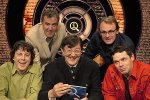 Firstly, thanks must go to QI Fanatic for his astounding work on this blog and for giving me the role of one of his bloggers. I’ll be keeping my very small blog up for now, but I suspect that I will be transferring the posts over here at some point.
Firstly, thanks must go to QI Fanatic for his astounding work on this blog and for giving me the role of one of his bloggers. I’ll be keeping my very small blog up for now, but I suspect that I will be transferring the posts over here at some point.
In the meantime, my objective is to bring you profiles on the main participants in QI. That means that every week, you can read up on information regarding Stephen, Alan, Jo Brand, Phill Jupitus, Bill Bailey and so on. This will continue until late September/early October, when series E of QI begins broadcasting on BBC Two. So today, here is a profile of the QI-master, Stephen Fry.
Born Stephen John Fry on 24th August 1957 in Hampstead, London, the 6' 4½" legend is the son of British scientist Alan Fry, and Marianne Neumann, an Austrian of Jewish descent. Writer, actor, and comedian, Fry lives in his London SW1 flat and his Norfolk house when not travelling. He grew up in Norfolk (where his parents still reside) and attended Uppingham School and Stout's Hill. After serving three months in Pucklechurch prison for credit card fraud at the age of seventeen, he attended Queens College, Cambridge in 1979, finishing with a 2:1 in English in 1981/2.
While at Cambridge, he was a member of the Footlights society, alongside Thompson, Tony Slattery, Martin Bergmann, and his now best friend Hugh Laurie. His prolific writing partnership with Laurie began in 1981, starting with Footlights revues for (among others) Mayweek, the Edinburgh Fringe Festival, and a three-month tour of Australia. In 1984, Fry was engaged to do the rewrite of the Noel Gay musical Me and My Girl, which made him a millionaire before the age of 30, and also earned him a nomination for a Tony award in 1987. Throughout the 1980s, Fry wrote for newspapers, magazines and hosted his own radio comedy show, Saturday Night Fry, with Laurie, Thompson and Broadbent often appearing as guests, and was a contestant on Whose Line is it Anyway? He also appeared in an episode of The Young Ones, as part of a University Challenge skit (he was familiar to this role, having been part of a real panel on the show not long before). He is perhaps best known for his television roles in Blackadder II and Blackadder Goes Forth as Lord/General Melchett, and in a cameo as the Duke of Wellington in Blackadder the Third. He went on to play the valet Jeeves in Jeeves and Wooster (1990), alongside Hugh Laurie as Bertie Wooster. Both shows ran for 4 successful series.
Fry's acting career has not been limited to films and television though. He had successful runs in Alan Bennett's Forty Years On, Simon Gray's The Common Pursuit with John Sessions, Rik Mayall, and others. Gray's Cell Mates was less successful. During what Fry described as one of his ‘episodes’ in his documentary The Secret Life of the Manic-Depressive, he walked out of the play. He then tried to commit suicide before later resurfacing in Belgium. Over that weekend, he had considered suicide and has since spoken frankly on the subject. Fry has published four novels as well as a collection of his radio and journalistic miscellanea. He has recorded audiotapes of many works for both adults and children, including the Harry Potter novels. As earlier reported on this blog, Stephen Fry is one of only 5 people to know the end of the final book in the series.
More recently, he has appeared in US drama Bones, directed his own film Bright Young Things and hosted the BAFTA awards. Fry is currently starring in the ITV1 drama Kingdom. A second series has already been commissioned and is currently in production.
Most readers of this blog will recognise Stephen Fry primarily as the host of QI. However, it was not originally intended that he would be the host of the show. When John Lloyd first presented the idea (which soon changed from a radio show to a TV show) he imagined Fry as a team captain with Michael Palin hosting the game. Palin turned down the role but QI has continued to be a huge success with Fry at the helm.










